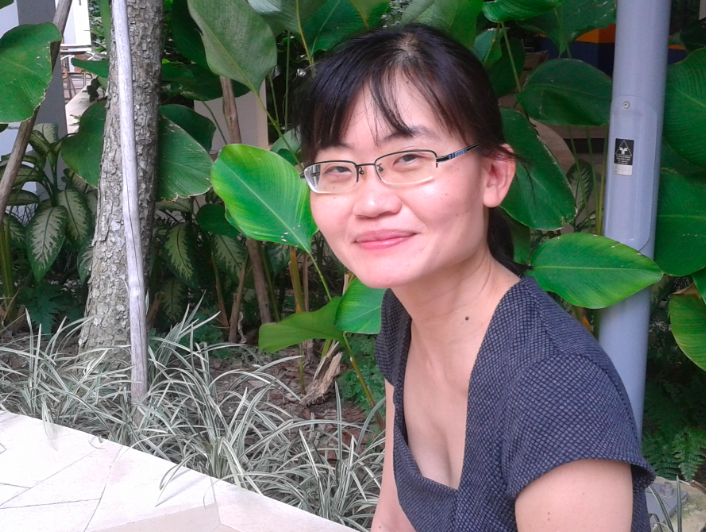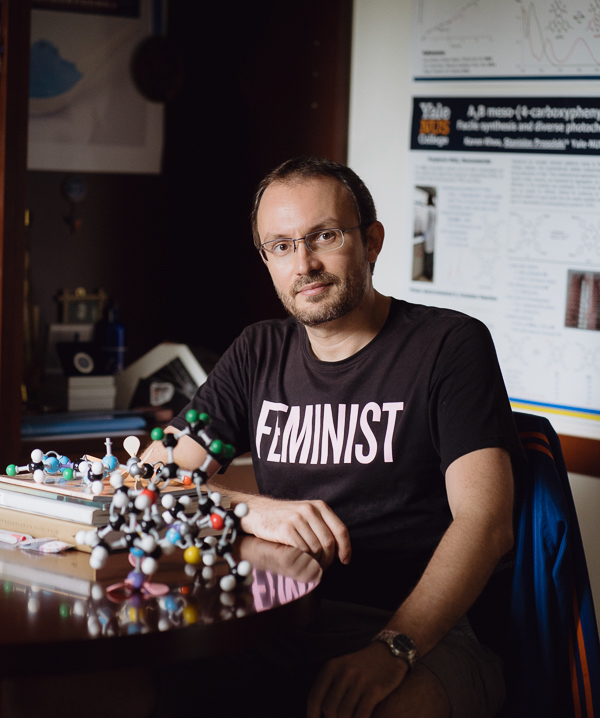Teaching Awards recipients share their memorable experiences working at Yale-NUS
Teaching Awards recipients reflect on their valuable memories teaching and inspiring students
A dedicated team of faculty members lies at the heart of the quality liberal arts and sciences education provided at Yale-NUS College. The annual Yale-NUS Teaching Awards celebrate exceptional faculty members whose teaching has greatly enriched the lives of their students and colleagues.
There are two categories of Teaching Awards to recognise faculty members for their contributions: the Distinguished Teaching Award and the Early Career Teaching Award. This year, Associate Professor of Humanities (History) Claudine Ang received the Distinguished Teaching Award, while Assistant Professor of Social Sciences (Environmental Studies) Anthony Medrano and Assistant Professor of Science (Chemistry) Stanislav Presolski received the Early Career Teaching Award. We spoke to the award recipients, who shared about their teaching experience at Yale-NUS and their hopes for their students.
We are grateful to have incredible faculty members like yourselves in the Yale-NUS teaching community. What makes teaching at Yale-NUS special for you?
Assoc Prof Ang: It is a privilege to teach students who come to class with interest and enthusiasm, and who are not afraid to put in the work to learn. The students whom I have taught here are self-motivated and curious about the subject matter, and their openness to learning makes them such a joy to teach.
 Associate Professor of Humanities (History) Claudine Ang received the Distinguished Teaching Award.
Associate Professor of Humanities (History) Claudine Ang received the Distinguished Teaching Award.
Asst Prof Medrano: The teh-o-ais-kosong (sugarless iced tea), the location, the community, colleagues, the food, the small class sizes, the module possibilities, the pedagogical opportunities, the interdisciplinary values, and the passions and curiosities and “boleh/pwede/bisah” (can-do) spirit of the students.
Asst Prof Presolski: When I first learnt about Yale-NUS, I felt the excitement of an eureka moment that scientists live for. It might sound immodest, but this brand-new college “in Asia for the World” had my name written all over it—from its mission to redefine liberal arts education to its globally minded students and faculty, who have broad interests and care about topics that go beyond their specialisation. Yale-NUS students make my teaching feel relevant, going into society right away to apply what they learnt in and out of the classroom and making the world a more just, colourful, and exciting place.
How would you describe your teaching style, and why did you adopt it?
Assoc Prof Ang: I seek to actively engage the students in my teaching. Instead of asking them to conform to a set mould, I try to help my students develop their interests, find their own voice, and cultivate their own written expression. My hope for my students is that they develop independent-mindedness, and I see my classroom as a space in which they can learn to do that.
Asst Prof Medrano: Relaxed, grounded in place, collaborative, conversational, and interdisciplinary.
Asst Prof Presolski: Highly experiential and dynamic. The world is a wonderful place filled with weird physical and chemical phenomena, which are ours to notice and ponder about, so why not bring them to the classroom or the laboratory? Even in highly theoretical Organic Chemistry lectures, I try to bring a demonstration that is related to the molecules or reactions covered on the board and relate our conceptual drawings to something tangible that smells good, glows in pretty colours, or acts in an unexpected way. It is sometimes a challenge to find an appropriate item, so it keeps me on the lookout as I walk around or play with my children, which is good fun. Furthermore, my courses always have a final project or presentation, where each student decides what they will work on and in the process learn, as well as teach their classmates, but also me about some new aspect of chemistry or science.
 Assistant Professor of Science (Chemistry) Stanislav Presolski is a recipient of the Early Career Teaching Award. Image taken by taken by JX Soo for Yale-NUS College.
Assistant Professor of Science (Chemistry) Stanislav Presolski is a recipient of the Early Career Teaching Award. Image taken by taken by JX Soo for Yale-NUS College.
What is a memorable moment you have encountered as a teacher?
Assoc Prof Ang: I once assigned a chapter from Peter Zinoman’s book about the penitentiary system in Vietnam under French colonial rule. One part of the assigned reading discussed the popularity of French language education with the Vietnamese prison inmates. This perplexed some students because the inmates were jailed and guarded by the French, and they wondered about the practical use of French classes. From this position of the utility of education, my students focused on the ends to which education can be put. I took the opportunity to talk about education as the means through which to redeem situations: for the imprisoned Vietnamese, they found themselves in a mode of stasis; trapped in cells, they did not expect much movement from that situation. However, learning is inherently dynamic and the education itself takes the imprisoned student beyond the confines of the cell. In moments when one feels stuck, one can find unexpected freedom and meaning in education.
Asst Prof Presolski: One of the most sensorially memorable moments was when I examined the soap that a student made from butter. The foul butyric acid in the soap emanated an odour of dirty socks, which is not a particularly desirable scent for soap. Both of us immediately realised why there were no prior reports for using butter as the starting fat to make soap. I still keep a box of that “forbidden” soap in the laboratory and use it to show the dramatic effects acids and bases can have on certain molecules.
What are some key takeaways you hope students will bear in mind after completing your course?
Assoc Prof Ang: Failing to move forces larger than oneself, finding no joy in an office job – such situations contribute to a sense of disempowerment. Yet if one takes the time to educate oneself, the dynamism inherent in the lessons themselves can lead one out of stasis; moreover, if one learns from unpleasant situations, then that situation may itself be partially redeemed. The inability to alter external circumstances serves as an occasion for further self-betterment through the augmentation of understanding and self-understanding. In this way, even in the midst of seeming defeat, education redeems.
Asst Prof Medrano: That (biodiversity) history matters. That stories matter. That sources matter. That language, food, and art are important environmental archives, and that vernacular names matter. That there are many ways of knowing and that expertise comes in many forms.
 Assistant Professor of Social Sciences (Environmental Studies) Anthony Medrano is a recipient of the Early Career Teaching Award.
Assistant Professor of Social Sciences (Environmental Studies) Anthony Medrano is a recipient of the Early Career Teaching Award.
Asst Prof Presolski: My hope is that students will keep asking questions about the world and the societies they live in, rather than settle with an unsatisfactory status quo or a superficial explanation. Because when you start digging, you often discover that there is no fundamental reason behind most rules, dogmas, and structures, simply inertia that could actually be overcome with action.
Congratulations to the recipients of this year’s Teaching Awards! The positive impact they have on lives of their students is truly inspiring.





